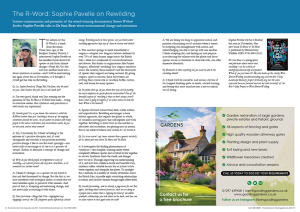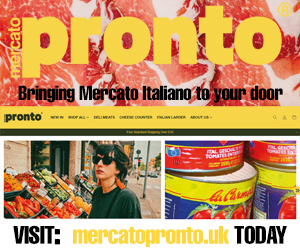
Science communicator and presenter of the award-winning documentary Beavers Without Borders, Sophie Pavelle talks to Dr Sam Rose about environmental change and restoration
This edition of the R-Word is a break from the norm. Three years ago, at the Bridport Literary Festival, I interviewed Sophie Pavelle on her excellent book about UK species at risk from climate change—Forget Me Not. She now has another book out—about symbiosis in nature—and I will be interviewing her again about this in November, so I thought I would get her take on Rewilding.
Q: So, Sophie Pavelle of Forget Me Not fame, how the devil are you, and I believe that you have a new book out?
A: I’m very good, thank you! Just coming out the epicentre of the To Have or To Hold tour-nado…trying to convince readers that symbiosis and parasitism is well worth our captivation!
Q: Sounds great! So, as you know, this column is called the R-Word (rather than just ‘rewilding’) because of the ongoing contention around the word. As an author in contact with many people in the nature restoration and conservation world, do you use the word, and in what context?
A: Yes, I absolutely do. I think ‘rewilding’ is the epitome of a positive disruptor and, if used strategically and sensibly, it can provoke powerful, positive change. I like to use the word sparingly—not necessarily to encourage us to see it as a process of ‘return’. Rather, to illustrate a concept of change and restoration.
Q: Why do you think people are frightened or wary of rewilding—or natural process-led ecosystem restoration, as its somewhat less catchier name?
A: I think it’s change—as a species we are wired to fear and feel threatened by change. But the fact is, we have interfered with ecological niches so much that we must interfere again, to preserve what remains. And part of that, is accepting and embracing change, and not necessarily associating it with threat.
Q: Your first book—Forget Me Not—highlighted very engagingly some of the UK’s forgotten species affected by climate change. Thinking back to those species, can you think where rewilding approaches help any of them to survive and thrive?
A: The one that springs to mind immediately is seagrass—chapter two. Seagrass habitats declined by over 70% of their former range across the British Isles—their loss accelerated by coastal disturbance and disease. But thanks to organisations like Project Seagrass, effectively ‘rewilding’ lost seagrass meadows across the country, these meadows and the thousands of species they support are being restored. By giving seagrass space to recover, these ecosystems are reviving their crucial role as coastline buffer, carbon sink, and home for many species.
Q: To follow that up, do you think that may still be putting too much emphasis on species-focused conservation? One of the beautiful aspects of rewilding is that we don’t always (ever?) know what is going to happen if we allow nature to take the lead. What is the balance?
A: Species-focused conservation feels a little archaic, and unproductive. Rewilding encourages a more holistic approach, that regards the planet as whole, of countless moving parts that self-regulate and work together. Rewilding is about trust in one another as advocates and custodians, but placing trust in nature, that it can achieve balance and sustain it—if we let it.
Q: So, in an acorn’s cup (more relevant than a generic nutshell), tell us about your new book To Have and To Hold.
A: It investigates the thrilling phenomenon of ‘symbiosis’—the complex, stunning reality where completely different species have evolved to live together to survive. Symbiosis binds the world, and changes how we see it. Through improving our understanding of it, and how lives collide in brutal and beautiful ways, symbiosis offers valuable lessons for us in how to live better together, and alongside the planet. To spotlight this, I embark on a medley of stormy adventures across the British Isles, to profile eight astonishing relationships in nature, and ask how climate change might affect them.
Q: Sounds fascinating, and its already a page-tuner for me! But again, thinking about natural processes, what are we doing as a people and a nation that is stopping the kind of incredible symbiotic relationships you talk about in the book, and how can we allow nature to once again take the lead?
A: We are taking too long to appreciate nature, and practice a fascinating act of restraint when it comes to accepting our entanglement with nature, and acknowledging our fate is tied up with one another. I think accepting this, and finding joy and purpose in re-dressing the balance with the planet and those species we are so fortunate to share life with, can offer immense liberation.
Q: Fantastic! Is there anything else you want to add to the rewilding debate?
A: I think we’d do ourselves and nature a favour if we stopped thinking quite so much, started trusting, and letting that trust translate into a not-so-radical act of doing.
Sophie Pavelle will be at BridLit this year in November. Her new book To Have or To Hold is published by Bloomsbury Wildlife. ISBN 9781399412162
Dr Sam Rose is a photographer and podcaster about nature and rewilding—see his website at whatifyoujustleaveit.info and podcast What if you just leave it?. He also heads up the charity West Dorset Wilding (westdorsetwilding.org) and the Brit Valley Landscape Recovery project (britvalley.org) but the views expressed here are personal and are not said on behalf of the Brit Valley Project or West Dorset Wilding.



